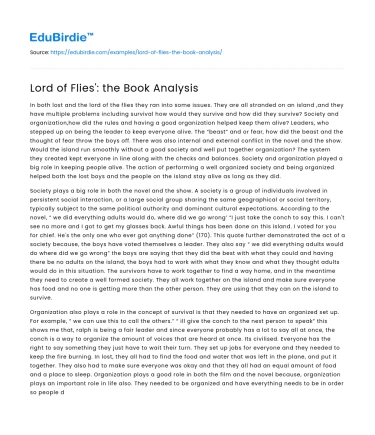Introduction
William Golding's 'Lord of the Flies' is a profound exploration of the intrinsic nature of humanity when stripped of societal norms and constructs. Published in 1954, the novel delves into the dark recesses of the human psyche through the lens of a group of boys stranded on an uninhabited island. Golding's narrative raises fundamental questions about civilization, power, and morality, challenging readers to consider the thin veneer that separates human civility from savagery. The novel's allegorical nature, coupled with its socio-political undertones, makes it a compelling subject for analysis. Through a detailed examination of character dynamics, symbolism, and thematic elements, this essay seeks to illuminate the complex layers of Golding's work. The inherent conflict between the impulses of civilization and the primal instincts of savagery becomes evident as the story unfolds, offering a stark commentary on the human condition.
Character Dynamics and Power Struggle
Central to 'Lord of the Flies' is the interplay between characters, which serves as a microcosm of society at large. Ralph and Jack emerge as the primary figures representing order and chaos respectively. Ralph, elected as the leader, symbolizes democratic governance and rationality. His leadership style is rooted in cooperation and the hope of rescue, as evidenced by his insistence on maintaining the signal fire. Golding writes, "We’ve got to make smoke up there—or die" (Golding, 1954), illustrating Ralph’s commitment to civilization. Conversely, Jack embodies an authoritarian rule, driven by primal instincts and the allure of power. His descent into savagery is marked by the formation of a tribe, where fear and violence replace order. The power struggle between Ralph and Jack reflects the fragile nature of societal structures and the ease with which they can disintegrate.
Save your time!
We can take care of your essay
- Proper editing and formatting
- Free revision, title page, and bibliography
- Flexible prices and money-back guarantee
The character of Piggy further underscores the theme of intellectualism versus barbarism. As a representation of scientific reasoning and logic, Piggy's reliance on the conch shell as a symbol of authority and order is poignant. However, Piggy’s tragic end signifies the triumph of brute force over intellect. The destruction of the conch shell alongside Piggy's demise metaphorically signals the end of structured civilization on the island. Simon, the introspective and mystical character, represents innate human goodness and moral insight. His untimely death at the hands of the frenzied boys serves as a harrowing reminder of the inherent evil lurking within humanity. These character dynamics elucidate Golding's skepticism about the sustainability of societal constructs in the absence of external controls.
Symbolism and Thematic Depth
Golding employs a rich tapestry of symbolism to convey deeper thematic messages within 'Lord of the Flies'. The island itself is a microcosm of the world, an isolated environment where societal norms are absent, thus allowing human nature to manifest in its rawest form. The conch shell, as previously mentioned, is a powerful symbol of civilization and order, its eventual destruction marking the collapse of social cohesion. Similarly, the 'beast' represents the primal fear and inherent evil within humans. Golding’s description of the beast as "a part of us" (Golding, 1954) suggests that savagery is an intrinsic aspect of human nature, suppressed but never eradicated by civilization.
The signal fire is another potent symbol, representing hope and the desire for rescue and return to civilization. Its fluctuating presence throughout the novel highlights the boys' wavering connection to their civilized past. The fire’s ultimate extinction parallels the loss of hope and descent into barbarism. Furthermore, the 'Lord of the Flies', a pig’s head mounted on a stick, serves as a tangible manifestation of the inner darkness that resides within each character. It offers a chilling commentary on the power of fear and its capacity to corrupt and dehumanize.
Counter-Arguments and Alternative Interpretations
While Golding’s portrayal of human nature is predominantly pessimistic, some critiques argue that it neglects the potential for altruism and cooperation inherent in human societies. Critics posit that the extreme conditions on the island exaggerate the boys' descent into savagery, suggesting that such a scenario may not be universally applicable. They point to real-life examples of communities that have thrived under adverse conditions, such as the cooperative rebuilding of societies post-natural disasters, as evidence of humanity’s capacity for resilience and unity. Moreover, the presence of characters like Ralph and Piggy, who consistently strive for order and morality, could be interpreted as a counterbalance to the overwhelming darkness depicted in the novel.
Additionally, the novel's focus on a group of young boys raises questions about the role of age and maturity in moral and ethical decision-making. Some scholars argue that the immaturity and lack of life experience of the characters contribute significantly to their inability to maintain order and civility. This perspective suggests that Golding’s conclusions about human nature might be overly deterministic and overlook the complexities of adult societal behavior. These counterpoints offer a nuanced perspective to Golding’s narrative, inviting further discourse on the multifaceted nature of humanity.
Conclusion
In conclusion, 'Lord of the Flies' stands as a poignant exploration of the human psyche, offering a bleak yet compelling commentary on the duality of human nature. Golding’s masterful use of character dynamics, symbolism, and thematic depth presents a narrative that is as unsettling as it is thought-provoking. While critiques of Golding’s pessimistic view of humanity exist, the novel’s enduring relevance suggests that it captures fundamental truths about the human condition. Whether seen as a cautionary tale about the fragility of civilization or an exploration of innate human savagery, 'Lord of the Flies' remains a seminal piece of literature that continues to inspire debate and reflection. Ultimately, Golding’s work challenges us to confront the darkness within and consider the societal constructs that bind us to civility.






 Stuck on your essay?
Stuck on your essay?

